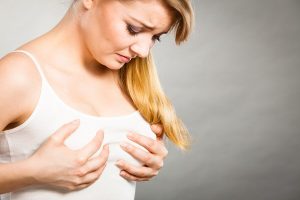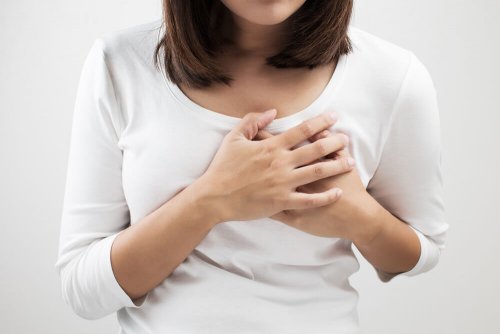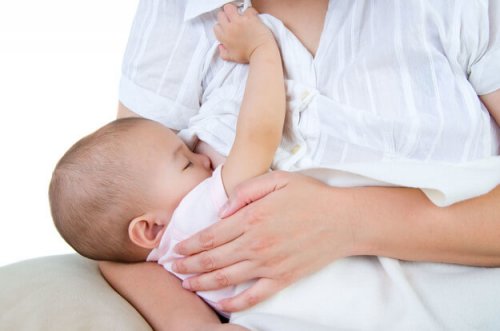Mastitis and Probiotics: An Effective Alliance

Statistics show that mastitis affects 10% of women who are breastfeeding. Actually, this condition has no effect on the health of the baby – it only causes discomfort and some anxiety for the mother. There is a solution though! Discover the very effective alliance between mastitis and probiotics.
When a mother suspects she may have mastitis, she’ll know that she’ll need medication and, quite understandably, will be concerned about the effects on her baby. This will generate anxiety and worry.
The acute pain that the mother with mastitis feels when breastfeeding her child can bring her to despair. If the doctor prescribes medication, she’ll want to prevent it from affecting her child.
People have often thought that the only solution to this is to stop breastfeeding and start giving formula milk. Nothing, however, compares to breast milk. The interruption of breastfeeding is totally unnecessary. In fact, in the case of mastitis, it’s actually the worst decision.
Mastitis and probiotics: a healing alliance
Mastitis is an infection, usually bacterial, that appears during the lactation period. The microorganisms enter the breast tissue, usually through a small cut on the breast, perhaps caused by the sucking action of the child.
The usual symptoms appear. The breast becomes inflamed, the skin turns red and the pain is very intense, similar to needles being stuck in the affected area. It makes the breastfeeding mother feel a bit depressed and listless.
As with most infections, the woman may need medication to cure it. This is where the relationship between mastitis and probiotics becomes very effective. Until a while ago, antibiotics were the only real option for treating mastitis.
There are, however, infectious agents that are resistant to them. These days, the use of probiotics is becoming more and more common, and the results are bringing about real improvement in the treatment of mastitis.

How do mastitis and probiotics interact?
In the relationship between mastitis and probiotics, there are some factors to consider:
- The perspective on treating mastitis is changing. Instead of trying to eliminate the microorganisms that cause the infection, the idea is to strengthen other microorganisms that are weak or have been lost.
- What are probiotics? They are living microorganisms that, when given in correct doses, improve the health of the body. These are usually lactobacilli and bifidobacteria.
- How do probiotics act in mastitis? Breast milk is not sterile. In the breast, there is a large number of microorganisms that help to create the baby’s intestinal flora. These microorganisms are balanced, but when the balance suffers alterations, mastitis appears.
- Through probiotics, doctors try to reestablish the balance. To do this, the mother will receive the living microorganisms that she needs.
- Why not antibiotics? Antibiotics aren’t actually bad in themselves, and don’t harm the child. However, there are strains that cause mastitis and that are resistant to antibiotics. Because of this, in some cases antibiotics aren’t effective. On certain occasions, doctors will use antibiotics and probiotics simultaneously.
- How do you know if the condition requires probiotics? By analyzing the breast milk, the specialist will see which strains are causing the infection, and which ones should be strengthened. Using this information, he’ll prescribe the correct probiotics for each individual case.
“The interruption of breastfeeding is not necessary; in fact, that is the worst decision in the case of mastitis “
Prevention through probiotics
In addition to what we’ve previously mentioned, other questions may arise regarding mastitis, such as:
- Can we prevent mastitis by taking probiotics? Taken in a correct dosage and format, probiotics can prevent mild mastitis. They prevent the colonization of staphylococci and streptococci, which are the agents that most frequently cause the infection.

- How should I take probiotics? Generally, they’re administered orally. In the pharmacy, they’re bought in tablet form, or in sachets. It’s always important to consult your doctor about whether it’s wise to take probiotics.
- What other effects do probiotics have during breastfeeding? In addition to preventing or curing mastitis, probiotics help treat other breast diseases and infections caused by milk.
- Do they affect the quality of the milk? It’s true that the use of probiotics slightly alters the milk’s composition, but it doesn’t affect the woman or the baby’s health at all.
In short, there are several problems that colonies of breast microorganisms can cause women. Mastitis is the most frequent one, and, as we’ve explained, mastitis and probiotics form a good alliance together.
Statistics show that mastitis affects 10% of women who are breastfeeding. Actually, this condition has no effect on the health of the baby – it only causes discomfort and some anxiety for the mother. There is a solution though! Discover the very effective alliance between mastitis and probiotics.
When a mother suspects she may have mastitis, she’ll know that she’ll need medication and, quite understandably, will be concerned about the effects on her baby. This will generate anxiety and worry.
The acute pain that the mother with mastitis feels when breastfeeding her child can bring her to despair. If the doctor prescribes medication, she’ll want to prevent it from affecting her child.
People have often thought that the only solution to this is to stop breastfeeding and start giving formula milk. Nothing, however, compares to breast milk. The interruption of breastfeeding is totally unnecessary. In fact, in the case of mastitis, it’s actually the worst decision.
Mastitis and probiotics: a healing alliance
Mastitis is an infection, usually bacterial, that appears during the lactation period. The microorganisms enter the breast tissue, usually through a small cut on the breast, perhaps caused by the sucking action of the child.
The usual symptoms appear. The breast becomes inflamed, the skin turns red and the pain is very intense, similar to needles being stuck in the affected area. It makes the breastfeeding mother feel a bit depressed and listless.
As with most infections, the woman may need medication to cure it. This is where the relationship between mastitis and probiotics becomes very effective. Until a while ago, antibiotics were the only real option for treating mastitis.
There are, however, infectious agents that are resistant to them. These days, the use of probiotics is becoming more and more common, and the results are bringing about real improvement in the treatment of mastitis.

How do mastitis and probiotics interact?
In the relationship between mastitis and probiotics, there are some factors to consider:
- The perspective on treating mastitis is changing. Instead of trying to eliminate the microorganisms that cause the infection, the idea is to strengthen other microorganisms that are weak or have been lost.
- What are probiotics? They are living microorganisms that, when given in correct doses, improve the health of the body. These are usually lactobacilli and bifidobacteria.
- How do probiotics act in mastitis? Breast milk is not sterile. In the breast, there is a large number of microorganisms that help to create the baby’s intestinal flora. These microorganisms are balanced, but when the balance suffers alterations, mastitis appears.
- Through probiotics, doctors try to reestablish the balance. To do this, the mother will receive the living microorganisms that she needs.
- Why not antibiotics? Antibiotics aren’t actually bad in themselves, and don’t harm the child. However, there are strains that cause mastitis and that are resistant to antibiotics. Because of this, in some cases antibiotics aren’t effective. On certain occasions, doctors will use antibiotics and probiotics simultaneously.
- How do you know if the condition requires probiotics? By analyzing the breast milk, the specialist will see which strains are causing the infection, and which ones should be strengthened. Using this information, he’ll prescribe the correct probiotics for each individual case.
“The interruption of breastfeeding is not necessary; in fact, that is the worst decision in the case of mastitis “
Prevention through probiotics
In addition to what we’ve previously mentioned, other questions may arise regarding mastitis, such as:
- Can we prevent mastitis by taking probiotics? Taken in a correct dosage and format, probiotics can prevent mild mastitis. They prevent the colonization of staphylococci and streptococci, which are the agents that most frequently cause the infection.

- How should I take probiotics? Generally, they’re administered orally. In the pharmacy, they’re bought in tablet form, or in sachets. It’s always important to consult your doctor about whether it’s wise to take probiotics.
- What other effects do probiotics have during breastfeeding? In addition to preventing or curing mastitis, probiotics help treat other breast diseases and infections caused by milk.
- Do they affect the quality of the milk? It’s true that the use of probiotics slightly alters the milk’s composition, but it doesn’t affect the woman or the baby’s health at all.
In short, there are several problems that colonies of breast microorganisms can cause women. Mastitis is the most frequent one, and, as we’ve explained, mastitis and probiotics form a good alliance together.
All cited sources were thoroughly reviewed by our team to ensure their quality, reliability, currency, and validity. The bibliography of this article was considered reliable and of academic or scientific accuracy.
- Lee TS., Song EJ., Nam YD., Lee SY., Probiotics in human health and disease: from nutribiotics to pharmabiotics. J Microbiol, 2018. 56 (11): 773-782.
- Rainard P., Foucras G., A critical appraisal of probiotis for mastitis control. Front Vet Sci, 2018.
This text is provided for informational purposes only and does not replace consultation with a professional. If in doubt, consult your specialist.








